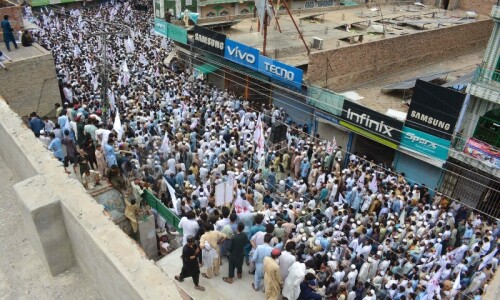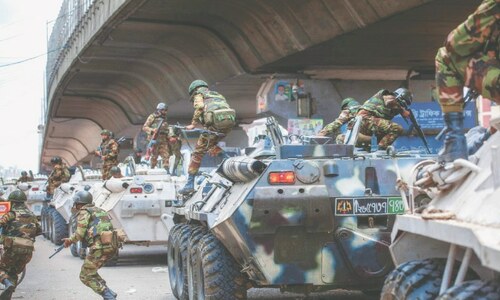KHYBER PAKHTUNKHWA and Balochistan are smouldering. Civil unrest has rocked the two provinces in recent days, with large protests culminating in violent confrontations between security forces and unarmed protesters in Khuzdar, Quetta and Bannu.
So far, the protests have focused on various security-related matters: in Balochistan, activists have agitated against continuing enforced disappearances, while KP has seen major disturbances over the killing of a poet as well as the Azm-i-Istehkam operation announced recently by the government.
However, with the impact of the new taxation regime becoming more pronounced as the first month of the new fiscal year draws to an end, there remains a very real possibility that public dissatisfaction over rising costs of living could also spill into the streets soon. This is a serious challenge for the government, which currently seems to be too preoccupied with legal and political developments to be paying enough attention to the deteriorating law-and-order situation.
What has been happening recently in both KP and Balochistan is important to understand. The protesters agitating in the two provinces have been sending a similar, clear message to the state: we have had enough. Be it the state’s long-condemned policy of disappearing citizens for extrajudicial ‘punishments’ or security operations that end up inflicting immense costs on ordinary citizens; the people are now intent on pushing back and regaining greater control over their lives.
In Balochistan, where years of brutal repression by the state have hollowed out the provincial political structure, it is women who are increasingly taking centre stage and taking the fight for civil rights forward. In KP, one of the key recruiting grounds for military forces, ordinary people are now adamantly insisting on peace and refusing any further part in Pakistan’s long wars. Unless the state lends its people a sympathetic ear, these troubles will continue to grow.
It is most unfortunate that the country’s democratic political system has been viciously undermined over the past few years. The parliamentary structure is supposed to act as a pressure release valve for public frustrations by giving people’s representatives a platform to share their grievances. Instead, it has been gradually distorted to the point that it now seems to represent the will of the few, instead of the aspirations of the many. There is, consequently, little faith in either its legitimacy or ability to solve ordinary people’s problems. Faraway Bangladesh, which is currently witnessing a massive public uprising led by students, is one example of what can happen when adverse economic conditions collide with entrenched sociopolitical dissatisfaction.
Pakistan cannot continue to sleepwalk through its crises. The government must start putting out fires instead of fanning more flames. This necessarily entails allowing the public to make itself heard. More suppression may only result in a bigger explosion of discontent.
Published in Dawn, July 21st, 2024














































Dear visitor, the comments section is undergoing an overhaul and will return soon.